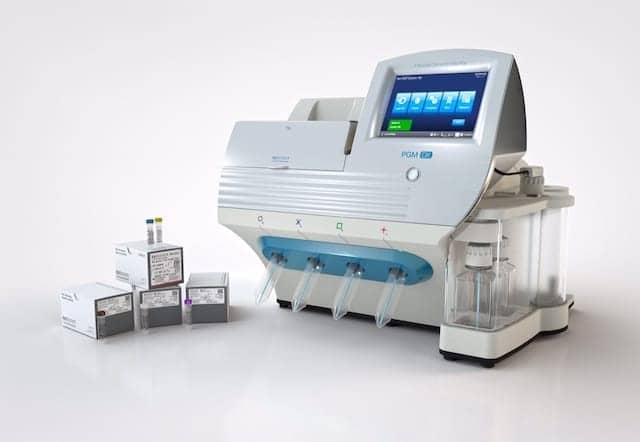FDA has granted premarket approval to Thermo Fisher Scientific, Waltham, Mass, for the first next-generation sequencing (NGS)-based test that simultaneously screens tumor samples for biomarkers associated with three FDA-approved therapies for non-small cell lung cancer (NSCLC).
The Oncomine Dx Target test simultaneously evaluates 23 genes clinically associated with NSCLC. Following FDA approval, results from analysis of three of these genes can now be used to identify patients who may be eligible for treatment with one of the following: the combined therapy of Tafinlar and Mekinist, Xalkori, or Iressa. With this test, physicians can now match patients to these therapies in days instead of several weeks, which it often takes when screening samples one biomarker at a time.
“For people battling non-small cell lung cancer, time is critical and days matter,” says Joydeep Goswami, president of clinical next-generation sequencing and oncology at Thermo Fisher. “The Oncomine Dx Target test rapidly guides oncologists toward the right targeted therapy, with the goal of improving patient outcomes and the cost-efficiency of treatments.”
LabCorp’s diagnostics and Covance businesses, NeoGenomics Laboratories, and Cancer Genetics Inc, are among the first laboratories that will offer the Oncomine Dx Target test as a service to oncologists. All tests will be run on Thermo Fisher’s Ion PGM Dx system, which received FDA 510(k) clearance in parallel for use on formalin-fixed, paraffin-embedded tissue (FFPE) samples.
“This first iteration of the test is just the beginning since the diagnostic claims of the Oncomine Dx Target test may be expanded in the future based on the existing panel,” Goswami adds. “Thermo Fisher has entered into discussions with several pharmaceutical companies looking to use the panel for FDA-approved targeted therapy applications beyond lung cancer. Expanding the range of clinically actionable information is part of the company’s goal to help our customers advance precision medicine.”
Thermo Fisher developed the Oncomine Dx Target test in collaboration with Novartis and Pfizer. It is based on Thermo Fisher’s Ion AmpliSeq technology, which enables screening of tumor samples for multiple genetic markers with 10 ng of nucleic acid. Returning results using such a small amount of FFPE material is a critical advantage of the test since samples from patients with NSCLC are often limited in quantity.
For more information, visit Thermo Fisher Scientific.





